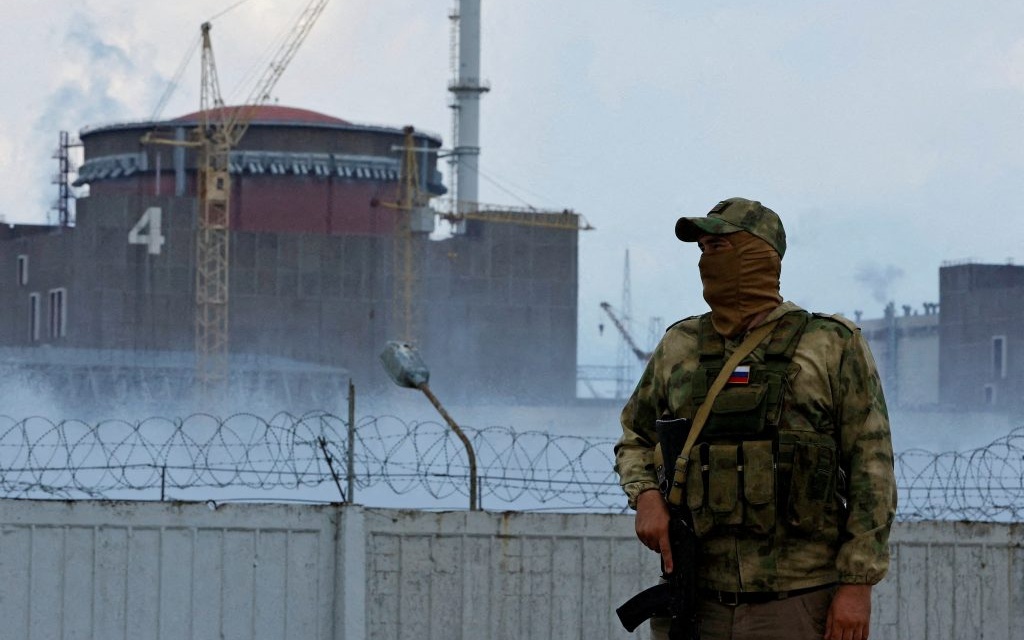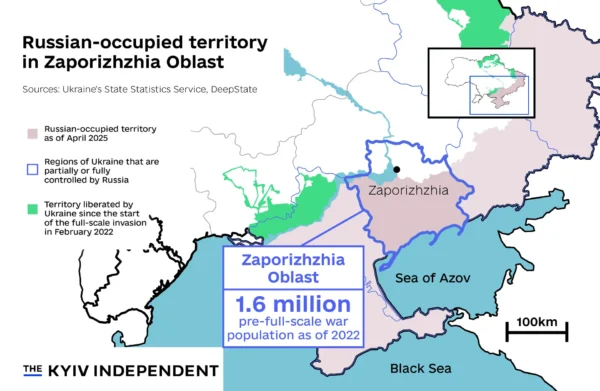A Russian soldier at the occupied Zaporizhzhia Nuclear Power Plant in southern Ukraine, August 4, 2022 (Alexander Ermochenko/Reuters)
Tuesday’s Coverage: Russia Murders Family of 4 in Sumy
UPDATE 1518 GMT:
Russia is preparing to import gasoline from China, South Korea, and Singapore to offset domestic shortages, reports the pro-Kremlin outlet Kommersant.
The Russian Government plans to lift import duties on fuel entering through select checkpoints in the Far East. The state will also subsidize importers by covering the gap between global market prices and lower domestic fuel prices.
Officials also plan to boost gasoline imports from Belarus and to lift a ban on monomethylaniline, an octane-boosting additive used to increase fuel production at refineries. The chemical has been banned in Russia since 2016 because of toxicity and potential cancer risks.
Writing to Prime Minister Mikhail Mishustin, Deputy Prime Minister Alexander Novak warned that the risk of further deterioration in Russia’s domestic fuel supply remains, despite the government’s planned interventions.
UPDATE 1509 GMT:
The European Union has delivered to Ukraine another €4 billion ($4.7 billion) under the G7 loan backed by frozen Russian assets.
The funds will be used to cover budget needs in defense, social programs, and recovery efforts, the Ukrainian Finance Ministry announced.
The EU has sent €14 billion euros ($16.4 billion) to Ukraine as part of the Extraordinary Revenue Acceleration loans initiative. The bloc has pledged €18.1 billion ($21.2 billion) as part of the G7’s $50 billion loan.
UPDATE 1444 GMT:
The rate of Russia’s gradual advance in eastern Ukraine slowed significantly in September.
Russian forces seized 44% less territory in the Donetsk region and elsewhere compared to August. The 259 square km (100 square miles) was just 0.04% of Ukraine’s total area, the smallest advance since May.
Russia now occupies around 19.04% of Ukraine’s territory.
Moscow’s most notable captures were near the village of Novopavlivka in the Donetsk region, described by the battlefield monitor DeepState as one of the most challenging sections of the frontline.
UPDATE 1142 GMT:
A Ukrainian drone attack has killed a Russian proxy official in southern Ukraine.
Volodymyr Leontiev, the head of the town council of Russian-occupied Nova Kakhovka in the Kherson region, was wounded by a Baba Yaga drone and died in hospital later in the day.
Leontiev, 61, became head of the town council in April 2022, weeks after the Russians overran Nova Kakhovka and part of the region.
UPDATE 1056 GMT:
Overnight Russian strikes have hit a market in Kharkiv in northeast Ukraine for the eighth time during the full-scale invasion.
The Barabashovo market in the Kyivskyi district, which covers 2,800 square meters, caught fire.
The attack injured six people. It also damaged residential buildings, a railway, and critical infrastructure, causing power outages and water restrictions.
In the market, Khaibar Karimi said his sewing supplies shop burned down for the second time:
Just reopened, just started working – second hit.
The first time was still okay, the second time – we borrowed money. People helped, we worked in debt. Unfortunately…we’re left with nothing now. Everything we had – we lost again. We don’t know what to do next, how to live.
Russian forces launched guided aerial bombs and missiles at Kharkiv overnight, terrorizing civilian population.
The strikes hit residential areas, a major market, and garage cooperatives across two districts and injuring at least six people.
State emergency service, Suspilne pic.twitter.com/i9rjIolSg4
— Euromaidan Press (@EuromaidanPress) October 1, 2025
UPDATE 1048 GMT:
Opening a European Union summit in Copenhagen on security and defense, Danish Prime Minister Mette Frederiksen has said:
I think the war in Ukraine is very serious. When I look at Europe today, I think we are in the most difficult and dangerous situation since the end of the second world war – not the Cold War.
She supported the bolstering of air defenses and a “reparations loan”, drawn from frozen Russian assets, for Ukraine:
Let me be very clear: there has to be a common European goal on this, otherwise we will be divided, and that is not the right way forward for Europe.
I think we have to leave our national perspective talking about security in Europe, and look at the pattern. With the hybrid war going on, and look at the war in Ukraine, not as a war in a European country Ukraine, but as a Russian attempt to threaten all of us. …
I hope that everybody recognises now that there is a hybrid war, and one day it’s Poland, the other day, it’s Denmark, and next week it will probably somewhere else that we see sabotage, or we see drones flying….
So I see this from a European perspective. There is only one country that are willing to threat us, and it is Russia and therefore, we need a very strong answer back.
UPDATE 0908 GMT:
At least five civilians have been murdered and at least 51 injured by Russian attacks across Ukraine over the past day.
Air defenses intercepted 44 of 49 drones. Russia also fired four Iskander-M or KN-23 ballistic missiles.
In the Chernihiv region in northern Ukraine, a man was slain by a Russian Iskander missile which damaged an agricultural enterprise and destroyed a car.
In Dnipro city in south-central Ukraine, one civilians was killed and at least 31 injured, including three juveniles.
In the Donetsk region in the east, one person was murdered and eight wounded. In neighboring Kharkiv, a 64-year-old man was killed and five wounded.
In the Kherson region in the south, one civilian was killed and three injured. Five high-rise buildings and six houses were damaged.
Casualties were also reported in the Sumy region.
UPDATE 0843 GMT:
Taiwan became the world’s largest importer of Russian naphtha, a fossil fuel derivative and a major source of Moscow’s export revenue.
Taiwan’s monthly imports surged sixfold between 2022 and the first half of 2025, generating $1.7 billion in mineral extraction tax revenues for Russia, says the joint study by four international environmental groups.
The island purchased 6.8 million tons of Russian naphtha between February 2022 and June 2025, worth a total of $4.9 billion —- including $1.3 billion in the first half of this year. The import accounts for 20% of Russia’s total naphtha exports.
While Taiwan has provided $50 million in bilateral aid to Ukraine during Russia’s full-scale invasion, it has imported Russian fossil fuels worth $11.2 billion.
UPDATE 0546 GMT:
Romanian Foreign Minister Oana Toiu has confirmed plans to partner with Ukraine on drone production to protect NATO airspace.
“We believe it is strategic for [NATO’s] eastern flank to be better protected, especially in air defence. So what we are doing in that direction is to create the partnerships needed, for example, with Ukraine to build defensive drones for the future,” Toiu said in an interview.
In the past three weeks, around 20 Russian drones flew over Poland with Polish and NATO air defenses downing several of them. UAVs have also fallen in Romania, and three Russian fighter jets violated Estonian airspace for 12 minutes.
Toiu said of the initiative with Ukraine, “We believe in our capacity to make it a reality fast.”
UPDATE 0536 GMT:
Amid gasoline shortages across the country, the Russian Cabinet extended the ban on the export of petrol until December 31.
Since August 1, Ukrainian drone strikes on at least 16 of Russia’s 38 oil refineries have cut output by around 17% to the lowest level since 2020. Gasoline rationing has been introduced in parts of the Russian Far East and in Russian-occupied Crimea.
On Tuesday, authorities also introduced a ban on diesel, marine fuel, and gasoil exports until December 31 for non-producers.
Moscow initially banned gasoline exports in July 2025 after a spike in the consumer price.
ORIGINAL ENTRY: Ukraine President Volodymyr Zelensky has warned of a “critical” situation at the Russian-occupied Zaporizhzhia Nuclear Power Plant, after nearby Russian shelling damaged nearby power lines on September 23.
The plant is located in the Zaporizhzhia region in southern Ukraine. Its 7 1/2-day cutoff from the electrical grid is the longest during Russia’s 44-month full-scale invasion.
The nuclear plant, the largest in Europe with six reactors, has been occupied by the Russians since March 2022. Although the reactors are dormant, power is needed for cooling and safety. Backup diesel generators are in operation, but the International Atomic Energy Agency has warned the situation may not be tenable.
Zelensky said in his nightly address to the nation, “The generators and the plant were not designed for this, have never operated in this mode for long, and we already have information that one generator has failed.”
He summarized, “This is a threat to everyone – no terrorist in the world has ever dared to do to a nuclear plant what Russia is doing. And it is right that the world does not stay silent.”
It is now the seventh day – something that has never happened before – of an emergency situation at the Zaporizhzhia Nuclear Power Plant. Because of Russian shelling, the plant has been cut off from power, disconnected from the electrical grid, and is being supplied with… pic.twitter.com/hUSusfgVjy
— Volodymyr Zelenskyy / Володимир Зеленський (@ZelenskyyUa) September 30, 2025
IAEA head Rafael Grossi said in a statement that the UN agency is “in constant contact with the two sides with the aim to enable the plant’s swift re-connection to the electricity grid”.
Using information from a team at the plant, Grossi evaluated:
While the plant is currently coping thanks to its emergency diesel generators – the last line of defence – and there is no immediate danger as long as they keep working, it is clearly not a sustainable situation in terms of nuclear safety.
The Kremlin has not commented on the threat. Instead, spokesperson Dmitry Peskov proclaimed on Tuesday that “many” Ukrainian citizens across the south want to become part of Russia.
Map: Nizar al-Rifai/The Kyiv Independent


